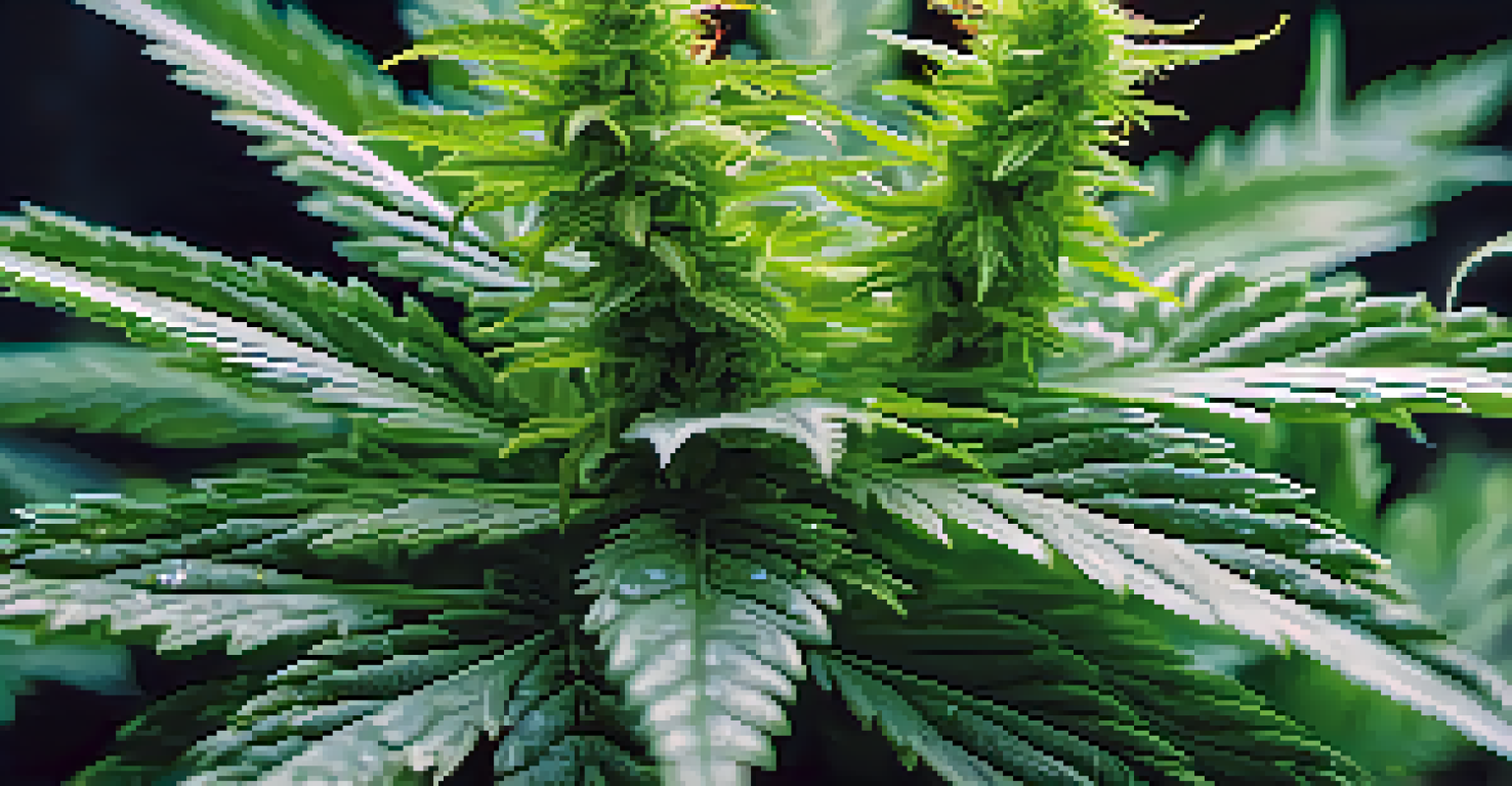Exploring Marijuana's Impact on Athletic Performance Outcomes

Understanding Marijuana: A Brief Overview
Marijuana, often referred to as cannabis, is a plant that contains compounds known as cannabinoids. The most well-known of these is THC, which is responsible for the psychoactive effects that many associate with the drug. CBD, another prominent cannabinoid, is known for its therapeutic benefits without the high. Understanding these compounds is crucial for athletes considering the potential effects on performance.
The greatest danger in times of turbulence is not the turbulence; it is to act with yesterday's logic.
In recent years, marijuana has gained attention not only for recreational use but also for its potential in sports. Athletes and coaches are increasingly curious about whether it can enhance performance or aid in recovery. With legalization sweeping across various regions, it’s essential to examine the scientific evidence supporting these claims.
The conversation surrounding marijuana's impact on sports performance is often polarized, with advocates citing its benefits and critics warning of potential drawbacks. As more athletes openly discuss their use of marijuana, it becomes increasingly important to explore the facts behind the hype.
The Science Behind Marijuana and Performance
Research on marijuana's effects on athletic performance is still in its infancy, but some studies suggest it may influence various physical and mental aspects. For instance, THC can potentially alter pain perception, which might help athletes push through discomfort during training or competition. However, the implications of this can be double-edged, as masking pain could lead to injuries.

On the flip side, marijuana is often lauded for its ability to promote relaxation and reduce anxiety. This could be particularly beneficial in high-pressure sports environments, where mental clarity and calmness are crucial. Athletes might find that a moderate dose helps them focus better, but the right balance is key, as too much could lead to impaired coordination.
Marijuana's Complex Impact on Performance
Research indicates that marijuana may influence pain perception and relaxation, but its effects can vary widely among athletes.
Furthermore, the effects of marijuana can vary significantly from person to person, influenced by factors such as tolerance and individual body chemistry. This variability makes it challenging to draw definitive conclusions about its overall impact on athletic performance.
Potential Benefits of Marijuana for Athletes
One of the most discussed benefits of marijuana for athletes is its potential for pain relief. Many athletes experience chronic pain due to rigorous training and injuries, and marijuana might offer a natural alternative to traditional pain medications. This could lead to fewer side effects, making it an appealing option for some competitors.
Addiction is a symptom of not growing up. It is a way of trying to solve your problems without facing them.
Additionally, marijuana's anti-inflammatory properties may aid in recovery after intense physical activity. By reducing inflammation, athletes could experience less soreness and quicker recovery times, allowing them to train harder and more often. This aspect is particularly appealing in a world where recovery is becoming more recognized as a vital part of athletic success.
Moreover, many athletes report that marijuana helps them with sleep quality, which is crucial for recovery and performance. A good night’s sleep can enhance cognitive function, mood, and overall physical performance, making marijuana an interesting addition to an athlete's recovery toolkit.
Risks and Considerations of Marijuana Use
Despite the potential benefits, there are also significant risks associated with marijuana use for athletes. One major concern is the impact on motor skills and coordination. For sports requiring precision and quick reactions, even a mild dose of THC could impair performance, leading to mistakes that might cost an athlete a competition.
Furthermore, marijuana is still banned by many sports organizations, including the World Anti-Doping Agency (WADA). Athletes found using it could face suspensions or disqualifications, which raises ethical questions about its use. The risk of losing one's career over a positive test can deter many from exploring its potential benefits.
Potential Benefits for Recovery
Marijuana may provide natural pain relief and anti-inflammatory benefits, aiding recovery and improving sleep quality for athletes.
Additionally, the legality of marijuana varies widely across regions, creating confusion for athletes who travel or compete internationally. It's essential for athletes to stay informed about the laws and regulations governing marijuana use in their sport and location.
Marijuana and Mental Health in Sports
Mental health is a critical aspect of athletic performance, and marijuana has been both praised and criticized for its effects on mental well-being. Some athletes claim that using marijuana helps alleviate symptoms of anxiety and depression, allowing them to perform better under pressure. This can create a more positive mindset, which is often a game-changer in competitive sports.
Conversely, marijuana can also contribute to feelings of lethargy or lack of motivation in some individuals, which could hinder performance. Athletes need to be mindful of how marijuana affects their mental state, as it may serve different purposes depending on the individual. It’s about finding the right balance that works for each athlete.
Moreover, the social aspect of marijuana use can’t be overlooked. For some athletes, sharing a joint after a game can be a way to bond and unwind. However, it's essential to recognize that this social use should not overshadow the potential risks associated with dependency or misuse.
Case Studies: Athletes Who Use Marijuana
Several high-profile athletes have openly discussed their use of marijuana, sparking conversations about its role in sports. For instance, former NFL player Ricky Williams has been an outspoken advocate, citing marijuana's benefits for relaxation and pain management. His story highlights how personal experiences can shape perceptions of cannabis in athletics.
On the other hand, there are athletes who have faced consequences for their marijuana use, such as Olympic sprinter Sha'Carri Richardson, who was suspended after testing positive. Her case underscores the tension between changing social attitudes toward marijuana and the rules governing its use in professional sports.
Risks and Legal Implications
Despite its potential benefits, marijuana use poses risks such as impaired motor skills and legal repercussions in many sports organizations.
These contrasting narratives illustrate the complex relationship between athletes and marijuana. While some find it beneficial, others face harsh penalties, creating a need for more comprehensive policies that consider not only the legality but also the health implications for athletes.
The Future of Marijuana in Athletics
As societal attitudes toward marijuana continue to evolve, its place in athletics is likely to change as well. With more research emerging, sports organizations may begin to reevaluate their policies regarding cannabis use. This could lead to a more nuanced understanding of marijuana’s impact on performance and recovery.
Moreover, as more athletes advocate for the normalization of cannabis, we may see increased acceptance within the sports community. This shift could foster an environment where athletes feel more comfortable discussing their experiences and the potential benefits of marijuana without fear of stigma.

Ultimately, the future of marijuana in athletics hinges on ongoing research and dialogue. As we continue to explore its effects, athletes will need to weigh the benefits against the risks, making informed decisions that align with their personal and professional goals.